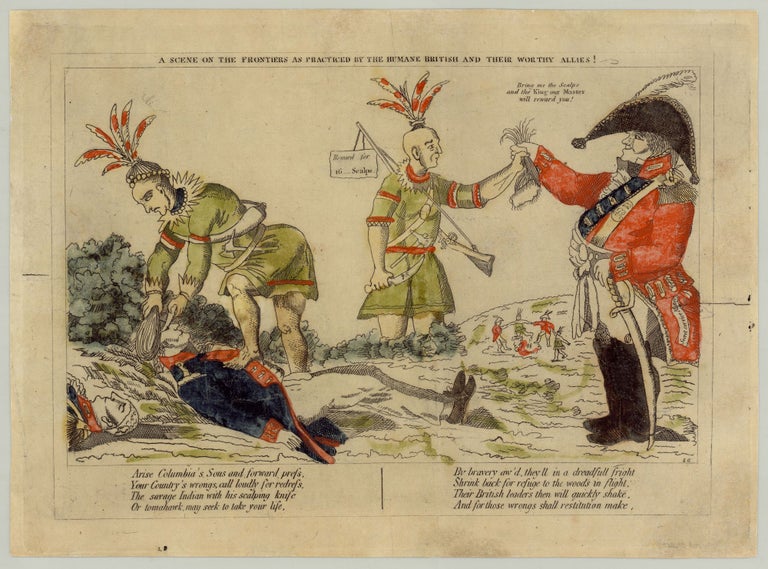A Scene on the Frontiers as Practiced by the Humane British and their Worthy Allies!
[Bristol, Connecticut?, ca. 1813.]. Hand-colored etching, 7.75” x 12.25”, sheet-size, 10.5” x 14.5”. A pirated edition of a William Charles War of 1812 satire picturing a gruesome battlefield scene with Native Americans scalping slain American soldiers and taking payment from a British officer for the scalps. This satire is thought to be a response to the 1812 Battle of Fort Dearborn (AKA the Fort Dearborn Massacre) near present-day Chicago, during which British Col. Henry Proctor is alleged to have purchased American scalps from Native Americans. The battle occurred on August 15, 1812, when Federal troops abandoned Fort Dearborn after the fall of Fort Mackinac to the British, resulting in utter defeat at the hands of 500 Potawatomi. This cartoon satirizes the British practices during the war—known to have taken place on the American frontier—of offering bounties to Indian allies to fight for them as well as for American scalps (the latter a practice that resulted in many deaths of soldiers and civilians). The British used native people—the Iroquois and their allies in particular—to terrorize their former American subjects on the frontier as far back as the Revolutionary War. On the right, a Native American hands a British officer the bloody scalp of an American soldier, presumably from the victim whose head and shoulders are visible in the lower left corner. The British officer says to the Indian, “Bring me the scalps and the King our master will reward you”; a sack of “secret service money” hangs from his coat button. The Indian carries a purse hanging from his flintlock that reads, “reward for sixteen scalps”; his knife and tomahawk bear the initials “G.R.” for Georgius Rex, i.e., King George. At left, a Native American bends over to scalp a fallen soldier, and in the background Indians and red-coated British soldiers hold hands and dance around a campfire. Eight lines of verse appear below the image, reading as follows:
Arise Columbia's Sons and forward press,
Your Country's wrongs, call loudly for redress,
The savage Indian with his scalping knife,
Or tomahawk may seek to take your life,
By bravery aw'd they'll in a dreadfull fright,
Shrink back for refuge to the woods in flight,
Their British leaders then will quickly shake,
And for those wrongs shall restitution make.
This pirated print by an unidentified engraver, signed “L.G.” in the lower right corner, is a reverse-copy of the original by Charles; another pirated version is known as well, in which the image is not reversed. The signature L.G. also appears on Patrick May’s A Map of Sackett’s Harbour, published in Bristol, Connecticut in 1815, suggesting that this print, too, may have been published in Bristol.
Scottish-born engraver, etcher, and caricaturist William Charles (1776–1820) emigrated to the U.S. where he practiced his trade from 1806 until his death. Best known for his political cartoons concerning the War of 1812, Charles published political caricatures in England as early as 1803 prior to his emigration, many of these prints addressing Bonapart’s threatened invasion of England. Charles is alleged to have left England to skirt the consequences of prosecution for caricaturing certain city magistrates. After living in New York City from the time of his arrival until 1814, he moved to Philadelphia where he opened up a print and book shop. The present print belongs to the series of etched caricatures he created during the ongoing War of 1812. Frank Weitenkampf has written that “The most noteworthy caricatures of the War of 1812 were prints by William Charles… they have a rough humor which no doubt made them popular.”
Worldcat records four copies at LC, Clements Library, Brown University and AAS.
A rare example of this print depicting the brutal realities of frontier conflict during the War of 1812.
REFERENCES: Lanmon, Lorraine Dwelling. “William Charles and his War of 1812 Caricatures.” Philadelphia Printmaking: American Prints before 1860 (West Chester, PA: The Tinicum Press, 1977), pp. 90-92; Library of Congress. A scene on the frontiers as practiced by the "humane" British and their "worthy" allies at loc.gov; Reilly, American Political Prints, 1812–2, 3 (the other two versions of the print); Weitenkampf, Frank. American Graphic Art (1924), pp. 17, 213; “William Charles (1776–1820),” Dictionary of American Biography.
CONDITION: Good, expert repairs to short tears in margins, expertly reinstated loss to boots of British officer.
Offered in partnership with Boston Rare Maps of Southampton, Mass.
Item #6711
Sold


